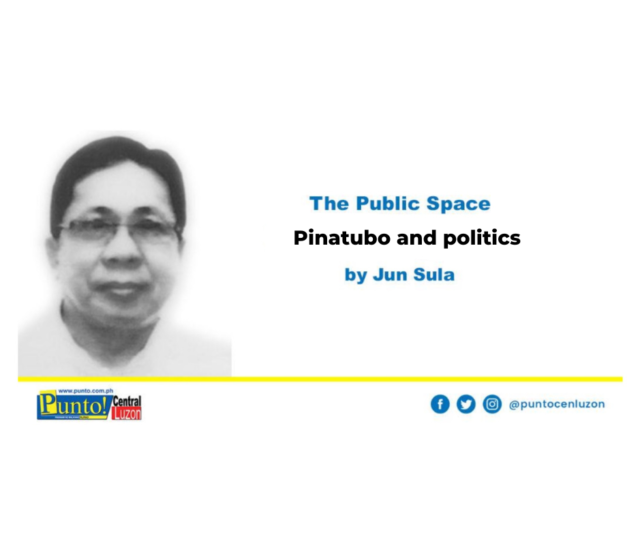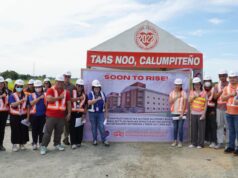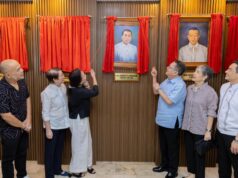It began with a myth.
The Aetas believed that a mining company drilling somewhere in the vicinity of the volcano angered a god, Apu Mallari. His wrath triggered a quiet, majestic eruption on independence day that turned into an ugly, messy nature’s spectacle. Thick and soggy ash falls rained down on trees and buildings three days later, blown hither and tither by a passing storm, it might as well be a perfect one. Branches broke, roofs collapsed, visibility was near zero on the road. Chaos and confessions were the order of the day.
So, it came to pass.
Dormant for more than half a millennium, the volcano suddenly erupted on an eventful day the American War Secretary Elihu Root and his American president, William McKinley or Theodore Roosevelt, agreed, as written in Gore Vidal’s historical fiction “Empire”, to talk about it at breakfast – the granting of Philippine independence. The Americans willed July 4th.
For a while, yes, indeed, that’s the way it was. Until a Kapampangan president, the poor boy Diosdado Macapagal, decided it should be changed to June 12 instead. The first was a white man’s burden; the second, the real Filipino act, the same date Emilio Aguinaldo willed in 1898. Years
later, that same poor president ran to the U.S. embassy in Manila, seeking political asylum in fear real or imagined) of his predecessor, who had declared martial law and was allegedly after him.
The rest , the new freedom day and fearing for freedom, is history. The Kapampangan president’s scary epiphany was declared imaginary. In time , twelve Filipino senators kicked the Americans out of their bases in Clark and Subic . But the real independence from the Americans came after a nearly-forgotten volcano in their colonial backyard blew up , and the Americans finally got the message unequivocally: time to pack up, Gringos. But look where we are today. The daughter – president of the Kapampangan president brokered a political deal with the daughter of another president and the son of the former dictator, who made the Kapampangan president sought asylum at the US embassy. In a blink ,it paved the way for the successful return to power of the dictator’s son. Time, poverty and probably the Pinatubo toxic effect must have fogged the Filipino mind.
Volcanologist doubted the myth. The volcano was more predictable than fickle-prone. Six hundred twenty years or so of geologic silence meant the eruption was due. And what a time! A martyr’s wife had ascended the presidency after a peaceful revolt forced the dictator and his family out of power, and the Senate Magnificent 12 booted the US military bases out of the country for good. The eruption was the historical exclamation point. The natural calamity spoke volumes and spewed billions of ash particles several kilometers into the atmosphere.
When the volcanic tragedy was still vivid in people’s—and politicians’ mind—it was thought that a permanent holiday was just right and fitting to commemorate both the collective struggle and triumph. In 2011, the year President Noynoy Aquino declared for the first time a non-working holiday for
Pampanga to remember Pinatubo, Third District Congressman Dong Gonzales dutifully refiled a bill on the same subject in the House of the Less Wise. Then Senator Bongbong Marcos assured Gonzales to push it in the House of the More Wise. Anticipating 2022?
It turned out not everybody was on the same page. The businessmen balked at the proposition. The idea of a Pinatubo holiday sounded well and good. The ancient Jews after all commemorate the crossing of the Red Sea out of Egypt, even their historic diaspora as recalled by a former mayor-lawmaker, Oscar Rodriguez. Why not their counterpart in these parts who fought a volcano’s destructive lahar flow and potential diaspora? But the province already had too many holidays. The business of businessmen was business, not politics. So the legislative plan was shelved until a more
opportune time.
Even the celebrated taipan who was at the front and center of the Pinatubo challenge, the late Levy P. Laus, was hunky dory on a mothballed Pinatubo non-working holiday idea. He believed there were the unsung heroes who deserved to be honored publicly. But that could be done later. The province was in an unprecedented recovery trajectory, no time to slow down the momentum, not even a holiday.
Years later, the same taipan urged everyone to wear their eyeglasses whenever they visited Clark, now a freeport zone under his watch, because the future looked so bright in the former American military base with billions in foreign investments poured in and thousands of jobs and other opportunities blooming as never before. Borrowing the words of a former president, Fidel V. Ramos, after whom the megadike that stopped the deadly lahar flow was named, the best was yet to come.
The Pinatubo tragedy enriched the Kapampangan’s vocabulary a bit. The governor then, Bren Z. Guiao, who was dared or warned by the taipan with a protest slogan ‘ to dike or to die”, set aside his ‘eka- magmalun- mibangun- ya –ing Pampanga’ go-go with a wry political humor defining as rara avis a man born only each time Pinatubo erupts. It probably helped ease his burden as the leader of a people staring at an unprecedented existential threat. Or unknowingly, predicted a popular actor emanating from the Pinatubo landscape dislodging him in a deluge of votes not unlike a lahar rampage.
Before the taipan died in a helicopter crash, he added three things to his sterling public andprivate life : a) gave a ceremonial public commendation of the unsung heroes and heroines, 2) brought Don Bosco back to Bacolor where it was uprooted and moved to Mabalacat by the volcanic upheaval and 3) finalized a concept for a Pinatubo monument with a local sculptor but stymied by the lack of an ideal site and funding ( it needed at least P10 million).
Last Friday, as the country celebrated its 124th independence day, outgoing President Duterte declared a non-working public holiday for Pampanga to commemorate the Pinatubo adversity. Duterte also leaves a fine legacy of a new world-class international airport in Clark airport, affirming Laus’ personal epiphany.
While the myth lives on with old politics and old prejudices, reality beckons with new hopes.





